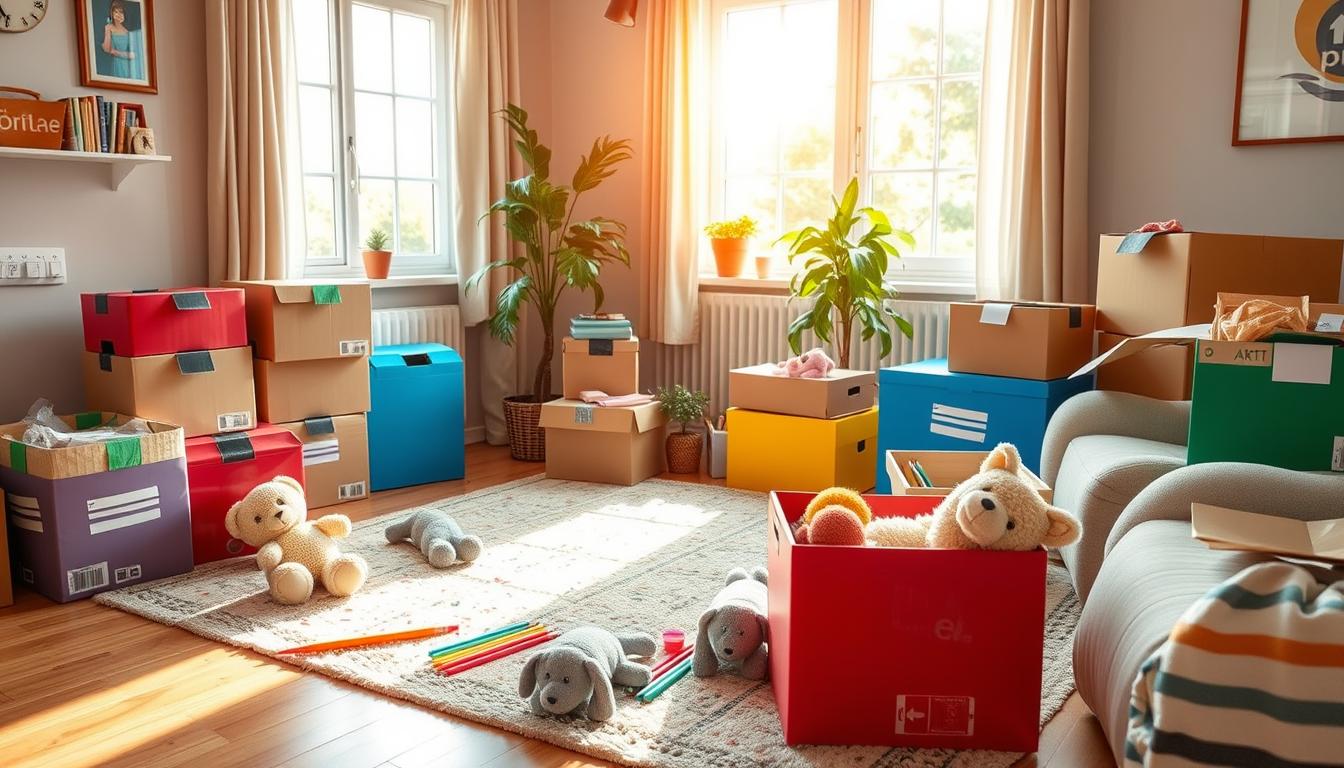What if moving to a new home didn’t make your kids anxious? Instead, it could be a chance for them to grow and explore new things?
Moving can be tough for kids. They have to leave friends and places they know. They also have to get used to new schools and communities. But, with the right approach, moving can be a positive experience.
Talking openly about the move helps. It’s important to listen to your child’s feelings. Letting them help with the move can make them feel more in control and less stressed.
Military families move more often and farther than others. They face unique challenges. Yet, kids can still find a sense of home in their new community, even if it’s temporary.
Erin Rovack Henderschedt uses gentle parenting to make new places feel like home. She uses familiar objects. Jacey Eckhart, who has moved 16 times, says letting kids have control during a move is key.
Dr. Jamie Howard suggests keeping routines the same after moving. This helps younger kids feel secure. For kids with ADHD, anxiety, or autism, regular routines are especially important.
Key Takeaways
- Open communication is crucial for preparing kids for a move.
- Validating their emotions helps reduce anxiety.
- Including children in the moving process empowers them.
- Maintaining regular routines post-move provides stability.
- Utilizing familiar objects to make new surroundings comfortable.
- Allowing kids a sense of control can ease the transition.
- Enrolling kids in extracurricular activities helps them establish new social connections.
Preparing Kids for the Move
Getting your kids ready for a move takes careful thought and planning. It’s important to listen to their worries and let them help out. This can make the big change less scary, especially for military families who move a lot.
Communicating Openly About the Move
Start talking to your kids about the move early. Tell them why you’re moving and what it means. Kids under five usually adjust fast because they don’t fully understand the changes.
Teens, on the other hand, might find it harder because of school and friends. Let them share their feelings and hopes. This is a chance to talk about big topics like puberty, remarriage, and stepchild relationships.
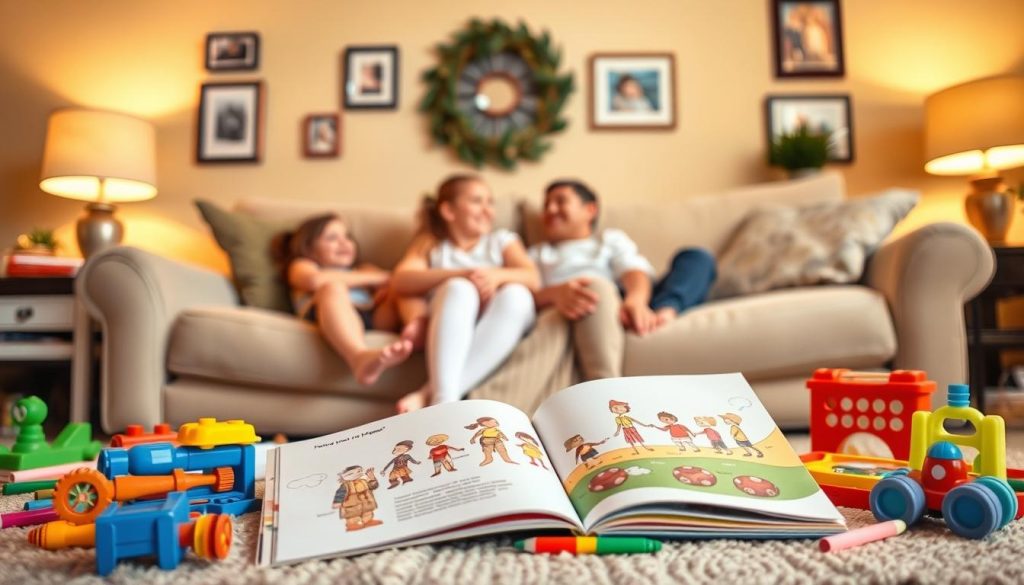
Validating Their Emotions and Feelings
It’s crucial to listen to your child’s feelings during the move. Give them a safe place to share their sadness, anger, or worry. Goodbyes and moving can affect kids for a long time.
By accepting their feelings, you help them deal with the change. For older kids, keeping up with friends from far away can be tough. Use this time to teach them about keeping relationships strong and consent.
Including Kids in the Moving Process
Letting school-age kids help with the move can make them feel more in charge. They can pack, label boxes, or pick colors for their new room. This helps them feel more in control.
Check in with their teachers a few weeks after the move to see how they’re doing. Keeping routines the same can also offer comfort in the midst of change.
Maintaining Regular Routines
Moving to a new home can be tough for kids. Keeping regular routines helps them feel safe and secure. It’s important to find a balance between too much change and too much routine.
Regular routines help kids learn to manage themselves better. They also help keep their mental health strong.
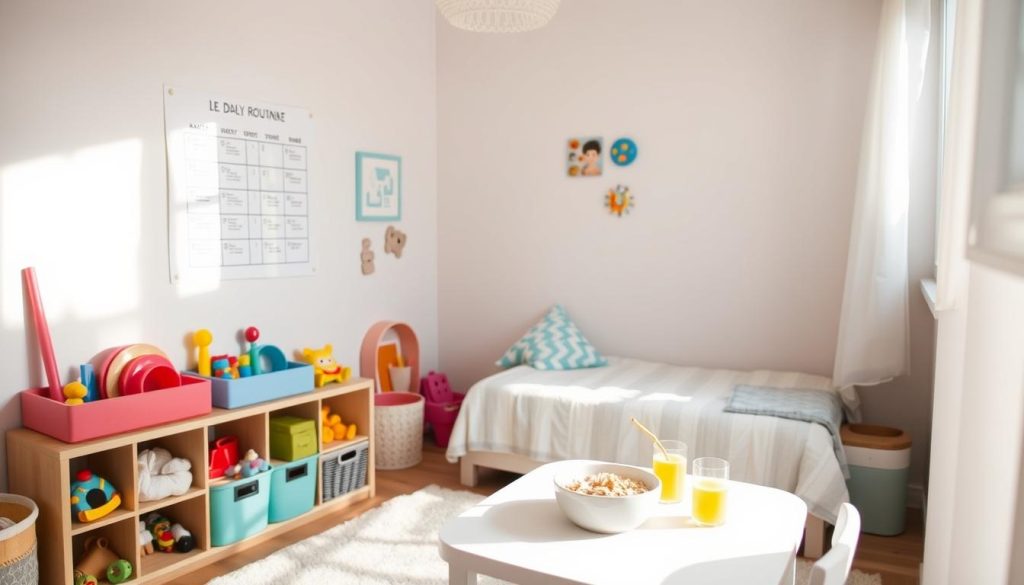
Consistency in Sleep Schedules
It’s key to keep a regular sleep schedule for kids. A bedtime that fits their age helps them sleep well. Bedtime stories or quiet activities before sleep are great parenting tips.
Even when moving, try to keep bedtime the same. Skipping naps can upset kids. Keeping bedtime routines helps them adjust to the new home.
Keeping Familiar Objects Close
Keeping familiar things close can make kids feel more at ease. Toys, bedding, and special items can make a new place feel like home.
Letting kids choose between old and new items can also help. It gives them a sense of control. This is especially good for middle children during moves.
Using Comforting Scents and Sounds
Familiar smells and sounds can make a new home feel more welcoming. Lavender or soft music can be very soothing, especially at night.
These sensory elements help create a calm routine. They’re especially important for kids dealing with divorce and children. They help kids feel safe and loved.
Family dinners, regular sleep, and playtime are key to a good routine. These habits are important for family budgeting and happiness. Regular activities, like Taco Tuesdays, can help kids feel secure and strengthen family bonds.
Adjusting to a New Environment
Moving to a new home can be tough for kids. It’s key to help them adjust well to avoid issues like anxiety and low self-esteem. By encouraging exploration and making a cozy space, you can ease their transition.
Exploring the New Home and Neighborhood
Exploring the new home and area together is vital. Visiting parks, libraries, and recreation centers can help your kids feel part of the community. If they loved coaching children’s sports, look for similar activities in the new place.
Setting Up Kids’ Rooms First
Setting up their rooms with their favorite things can be a comfort. Having familiar objects and personal items around makes them feel secure. Keeping routines, like monitoring kids screen time and sleep schedules, also helps.
Letting your kids help set up their rooms can make them feel more in control. Staying in touch with old friends online and using online family therapy can also provide support.
Good family budgeting can reduce stress from moving. This lets you focus on helping your kids settle into their new home.
Handling Parenting Challenges During the Move
Moving can be both exciting and stressful for parents. They have to balance many responsibilities. The average North American family moves every five years, facing various challenges.
It’s important to manage your emotions during the move. This includes dealing with grief over lost friendships and anxiety about new beginnings. This helps in a smooth transition.
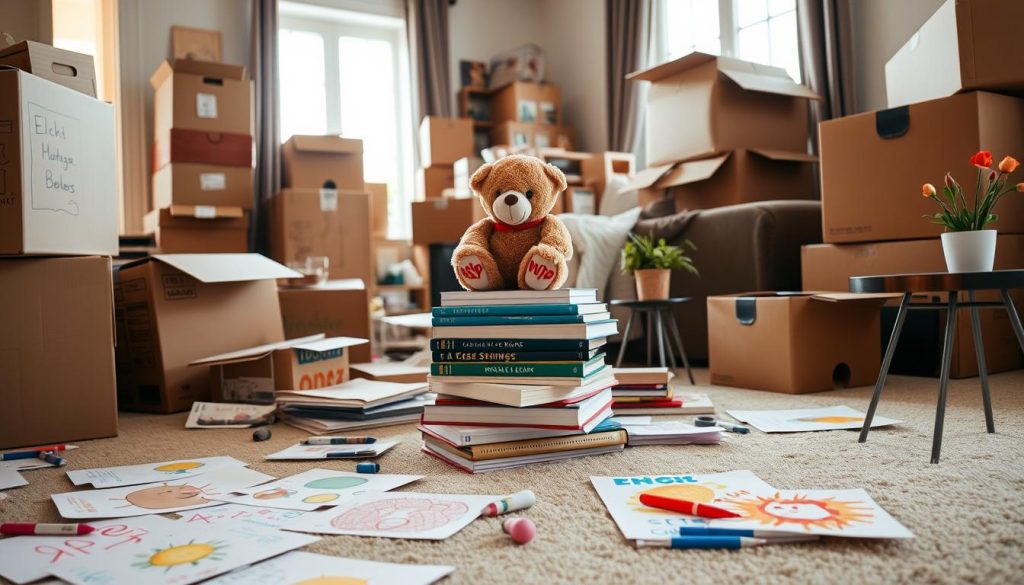
One big issue is dealing with sibling rivalry. This can get worse during big changes. It’s crucial to make sure your kids feel emotionally safe.
Focus on body positivity for kids. Celebrate their uniqueness and tell them their feelings are valid. This makes them feel secure during changes.
Teaching consent to kids is also key during moves. With new people and places, they need to know about boundaries. This helps them feel safe and confident.
Managing postpartum mental health is vital for parents. Your mood affects your kids. Stay positive to make the move exciting for them.
Plan activities that reduce stress. Create a comforting and familiar space. Be there for your kids when they need reassurance. A positive attitude from parents helps kids adjust better, making the move a positive experience for everyone.
Conclusion
Moving to a new home with kids can feel overwhelming. But, using gentle parenting can make it easier. By listening to their feelings and letting them help decide, you ease their stress. This helps prevent eating disorders and other issues.
Online family therapy is also a great help. It helps deal with the emotional stress of moving. Studies show that feeling heard and supported helps kids manage their feelings better.
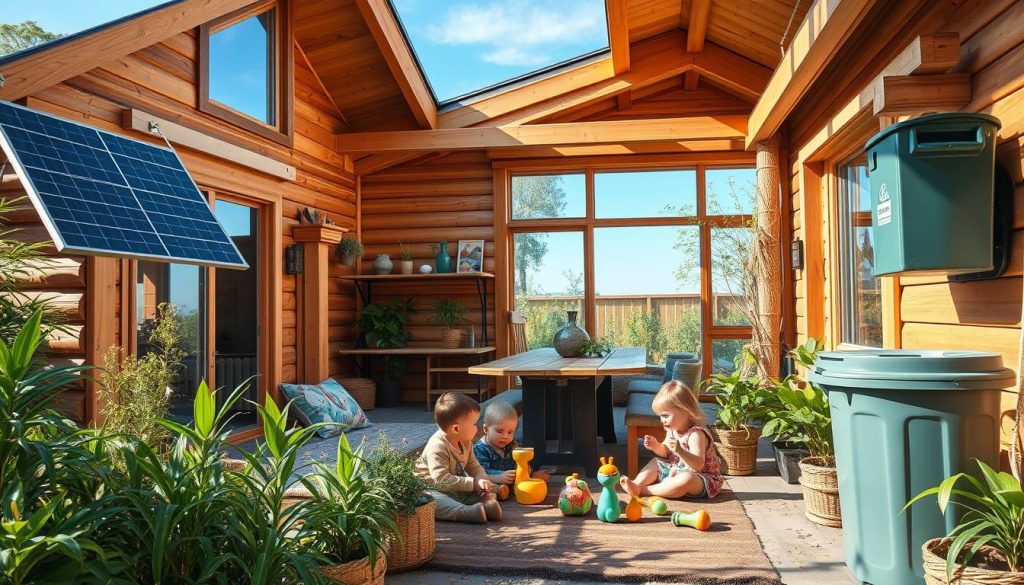
Using eco-friendly parenting strategies can also be a good idea. It can distract from the stress of moving and teach kids about caring for the planet. This approach makes them look forward to the future positively.
It’s important to keep things stable, but also let kids explore their new place. This can be a chance for them to grow. Research shows that supportive parenting reduces frustration and anger in kids.
By focusing on the good things, you set a positive tone for your family’s move. Moving is tough, but it’s also a chance to get closer and build resilience together.
Learn More Tips to Successfully Moving with Kids
Moving can be a great adventure for families. It becomes positive when you plan well and involve your kids. Research shows kids do better with clear, honest talk about the move.
Telling them why and when you’re moving helps. It builds trust and makes the move easier for everyone.
Getting your kids involved in the move is smart. Experts say it’s good to let them help with house hunting or packing. This makes them feel more in control and excited.
Also, taking them on a trip to the new town before moving is a good idea. It helps them get used to the place and feel less anxious.
After moving, keep regular routines and check in with your kids. This helps them share their feelings and eases any emotional challenges.
Encourage them to join clubs, volunteer, or participate in community events. This helps them feel part of the new place and makes friends.
If you need extra help, look into online family therapy. It’s great for kids with anxiety or other emotional issues during the move. By following these tips, your whole family can enjoy the new adventure together.
FAQ
How can I help my kids transition smoothly when moving to a new home?
What are some effective ways to communicate openly with kids about the move?
How do I validate my children’s emotions and feelings during a move?
Why is including kids in the moving process beneficial?
How can I maintain regular routines during a move?
What role do familiar objects and scents play in a new home environment?
How can exploring the new home and neighborhood help my child adjust?
Why is it important to set up kids’ rooms first in a new home?
How can I handle parenting challenges during the move?
Where can I find additional support and resources for moving with kids?
This post contains affiliate links. If you click on a link and make a purchase, I may earn a small commission — at no extra cost to you. Thank you for supporting this blog and helping me keep the patterns free! Read the full Affiliate Disclosure & Transparency.
